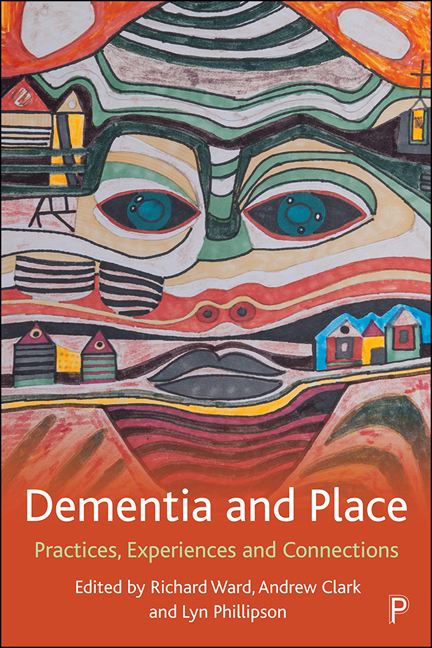Book contents
- Frontmatter
- Dedication
- Contents
- List of figures and tables
- Notes on contributors
- Acknowledgements
- 1 Introduction: Placing dementia
- 2 Understanding the meaning of neighbourhoods for people living with dementia: the value of a relational lens
- 3 Moving house with dementia
- 4 How do people with dementia manage problematic situations in public spaces?
- 5 Making and maintaining neighbourhood connections when living alone with dementia
- 6 My neighbourhood, my future ...?
- 7 Enabling the neighbourhood: a case for rethinking dementia-friendly communities
- 8 A conceptual framework of the person– environment interaction in the neighbourhood among persons living with dementia: a focus on out-of-home mobility
- 9 We’re known as ‘the girls’ around town: support, isolation and belonging for a lesbian couple living with dementia
- 10 Building community capacity for dementia in Canada: new directions in new places
- 11 The good, the challenging and the supportive: mapping life with dementia in the community
- 12 Growing back into community: changes through life with dementia
- 13 Dementia, tourism and leisure: making the visitor economy dementia friendly
- 14 Conclusion: Dementia emplaced
- Index
5 - Making and maintaining neighbourhood connections when living alone with dementia
Published online by Cambridge University Press: 13 May 2022
- Frontmatter
- Dedication
- Contents
- List of figures and tables
- Notes on contributors
- Acknowledgements
- 1 Introduction: Placing dementia
- 2 Understanding the meaning of neighbourhoods for people living with dementia: the value of a relational lens
- 3 Moving house with dementia
- 4 How do people with dementia manage problematic situations in public spaces?
- 5 Making and maintaining neighbourhood connections when living alone with dementia
- 6 My neighbourhood, my future ...?
- 7 Enabling the neighbourhood: a case for rethinking dementia-friendly communities
- 8 A conceptual framework of the person– environment interaction in the neighbourhood among persons living with dementia: a focus on out-of-home mobility
- 9 We’re known as ‘the girls’ around town: support, isolation and belonging for a lesbian couple living with dementia
- 10 Building community capacity for dementia in Canada: new directions in new places
- 11 The good, the challenging and the supportive: mapping life with dementia in the community
- 12 Growing back into community: changes through life with dementia
- 13 Dementia, tourism and leisure: making the visitor economy dementia friendly
- 14 Conclusion: Dementia emplaced
- Index
Summary
Introduction
This chapter draws on qualitative research using participatory methods to explore the experience of people with dementia who live alone. Drawing on data gathered in Sweden and the UK, the chapter highlights the distinct challenges of living alone with dementia and explores the different ways that people remain connected to neighbourhood places. We argue that the invisibility of such experiences to dementia policy and strategies (which typically assume the presence of a cohabiting carer or household member to provide support) needs to be addressed if dementia-friendly initiatives are to be truly inclusive.
Demographic projections show that the number of people living in single households will continue to increase steadily in many western and northern European countries and that older women are the fastest-growing section of the single householder population (Sundström et al, 2016; United Nations, 2017). The ageing population living alone in Europe also includes an increasing proportion of people with dementia (Prescop et al, 1999; Gaymu and Springer, 2010; Prince et al, 2015). In Canada, France, Germany, the UK and Sweden, between one third and one half of the population of people with dementia residing in a neighbourhood context live in single households (Ebly et al, 1999; Nourhashemi et al, 2005; Alzheimer's Society, 2013; Eichler et al, 2016; Odzakovic et al, 2019). Despite this increase in single householders with dementia, there is currently limited awareness of the particular challenges associated with living alone with dementia, even within emerging discourses and practices associated with dementia-friendly communities (Alzheimer's Society, 2013; Age UK, 2018; Odzakovic et al, 2018). As such, there is a danger that the creation of ‘dementia-friendly’ communities, and especially those based on communities of place, may rest upon a series of normative assumptions about dementia and about the relational context of people living with the condition.
Evidence from service-oriented research shows that people with dementia who live alone are more prone to (unplanned) hospitalisation (Ennis et al, 2014); are at greater risk of malnutrition (Nourhashemi et al, 2005); are likely to be admitted to long-term care at an earlier point in their journey with dementia (Yaffe et al, 2002); are often less well connected to formal services (Webber et al, 1994); and lack the advocacy of a co-resident carer (Eichler et al, 2016).
- Type
- Chapter
- Information
- Dementia and PlacePractices, Experiences and Connections, pp. 67 - 89Publisher: Bristol University PressPrint publication year: 2021



